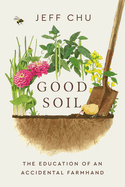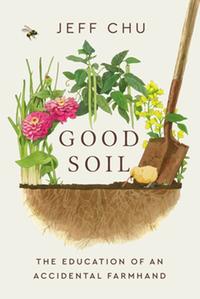
 Journalist Jeff Chu's wise, thoughtful second memoir, Good Soil, explores love, loss, complicated identities, and the power of community through his experience working on his seminary's farm. After enrolling at Princeton Theological Seminary at the age of 39, Chu took one class--and then many more--at the "Farminary," a working farm designed to provide a hands-on place for students to wrestle with spiritual questions while getting their hands (literally) dirty. Chu's time at the Farminary would prove transformative, and his experiences there helped mitigate the frustrations of doctrinal arguments and dry theological debates in his other courses. Furthermore, as Chu took part in the day-to-day tasks of life at the Farminary, he watched metaphors of growth, tending, harvest, roots, and flourishing--not to mention compost--come to life before his eyes.
Journalist Jeff Chu's wise, thoughtful second memoir, Good Soil, explores love, loss, complicated identities, and the power of community through his experience working on his seminary's farm. After enrolling at Princeton Theological Seminary at the age of 39, Chu took one class--and then many more--at the "Farminary," a working farm designed to provide a hands-on place for students to wrestle with spiritual questions while getting their hands (literally) dirty. Chu's time at the Farminary would prove transformative, and his experiences there helped mitigate the frustrations of doctrinal arguments and dry theological debates in his other courses. Furthermore, as Chu took part in the day-to-day tasks of life at the Farminary, he watched metaphors of growth, tending, harvest, roots, and flourishing--not to mention compost--come to life before his eyes.
Chu (Does Jesus Really Love Me?) lushly describes the community he found at the Farminary, including farm director Nate and fellow student Pearl, a Black woman whose peripatetic life had made her a self-proclaimed "child of many soils." As Chu learned the basics of planting, watering, weeding, and other essential tasks, he also began to develop a theology of compost and dirt. The compost pile, tucked away in a corner of the Farminary's garden, "was not merely a teaching tool or a prop," Chu writes. "It was the point." Even more than the tomato plants or boldly colored zinnias growing in the garden, the compost pile illustrated the farm's ultimate goal: to produce good soil. Out of scraps and waste, the compost pile produced "signs of life and death and resurrection." The pile, messy and smelly though it was, provided a living object lesson in the potential for new growth to emerge from the discarded or the seemingly random.
Alongside Chu's work at the Farminary, he digs into the layers of his own story as the gay son of Christian Chinese immigrants. Readers catch a glimpse of his deep childhood bond with his grandmother; his love for his parents, mixed with worry about whether they will ever truly accept his sexuality or his husband, Tristan; and his struggle to integrate all the aspects of his identity, as manifested in the Chinese long beans often ignored in the farm's CSA program. He also describes (in mouthwatering detail) the feast he prepared for friends and colleagues as his final Farminary project, and he recounts the loss of his dear friend and fellow author Rachel Held Evans (whose posthumous memoir, Wholehearted Faith, he edited).
With grace, sensitivity, and self-deprecating humor, Chu examines the question of belonging, the gifts of every season, and the continuing challenge of caring faithfully for the (literal and metaphorical) soil of one's own life. --Katie Noah Gibson, blogger at Cakes, Tea and Dreams
Shelf Talker: Jeff Chu's wise, thoughtful second memoir digs into the insights and community he found as a student working on his seminary's farm.

